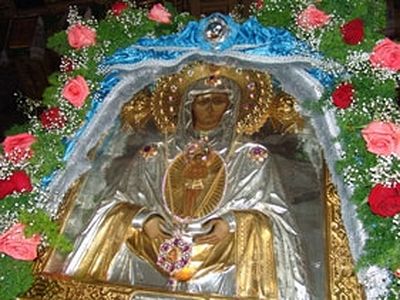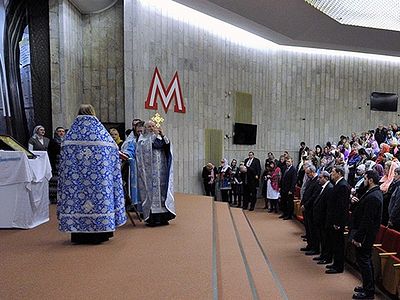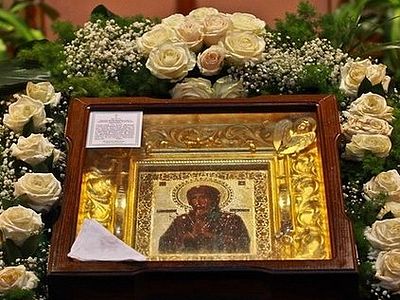A Conversation with Sergei Fomin, keeper of the Icon of the Theotokos, “The Softening of Evil Hearts”
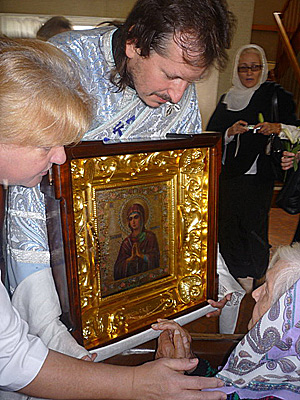
In July of 2010, the icon was again taken to the U.S. for veneration by the faithful, although perhaps not everyone knows the history of this myrrh- streaming icon. In order to provide more information on this icon, Pravoslavie.ru/Orthodox.com presents the English translation of an interview posted on its Russian site.
* * *
This icon is the contemporary work of Sofrino craftsmen. It is an ordinary lithograph. It had been in the apartment of Muscovite Margarita Vorobyova, where it began to gush myrrh. This happened in 1998, after it had been placed on the relics of the blessed Matrona of Moscow, during her glorification on the 2nd of May. After some time, the icon was miraculously transformed, and now many who have seen it cannot tell that it is a lithograph and not an icon painted long ago. Sergei Leonidovich Fomin, Margarita’s husband, who accompanies the icon, relates that he came to the USA at the invitation of the abbot of the Holy Trinity Monastery in Jordanville, Archimandrite Luke. Father Luke had seen the icon during the session of the Local Council in January of this year (2009 ed.), at which the new Patriarch of All Russia was chosen. The icon gushed myrrh especially abundantly during those days. Then Father Luke served the Liturgy, a Moleben before the icon, and gave the blessing to bring the myrrh-gushing icon to churches and monasteries in the USA.
A serviceman by profession, Sergei Fomin related that he has been accompanying the icon on trips to cities in Russia and abroad for eight years already.
“At first,” Sergei says, “the holy icon was at our home, Akathists were read there, prayers were said… But with time the icon began to gain publicity and it began to be invited to churches in Moscow. It was already becoming difficult to receive people in our home. People who had received help by praying before this icon—some had children born to them, some received healing from illnesses or help at work—donated money, and it became possible for us to build a chapel in honor of this icon, ‘The Softening of Evil Hearts.’ Now the chapel has become a church, although a small one, with an iconostasis and belfry. Liturgies and Molebens are served in our church in the town of Bachurino, which is five kilometers from Moscow.”
“This is not the only church in honor of this icon, ‘The Softening of Evil Hearts,’ that has been built over these years. Churches are also being built in places where we have been with this icon. One of them, in Cyprus, not far away from Larnaki, will soon be consecrated. Churches in honor of this icon have been built in two prisons. One is in the women’s section for underage girls in the Ryazan region, where the juvenile criminals serve their sentences for especially heavy crimes, including murder. Our benefactors undertook to build a church there. The girls also helped a lot; they even dug the trench for the foundation under the church building and wrote a song about the icon ‘The Softener of Evil Hearts.’ In Yaroslavl, a chapel in honor of this icon has been built in the men’s section. In Altai, in the city of Barnaul, they built a chapel in an orphanage.”
“The Mother of God travels to prisons, nursing homes, hospitals. Even in Germany we were in several prisons and in a jail. We try to be with it wherever there are Orthodox Russians, Serbs, Romanians. Everywhere, people pray and receive comfort.”
What cities and countries, besides the ones already mentioned, has the icon been to?
SF: Several times each in Saint Petersburg, Saransk, Cheboksary, Bryansk, Tula, around Yaroslavl and Nizhegorod, in Sevastopol, South-Sakhalinsk, Kostroma, and also in many other cities and villages—it’s impossible to tell them all. We have been in Georgia with this icon, a year ago in Greece—on Mount Athos. We are received very warmly in Czechoslovakia, where we always go in May. There, not only the Orthodox come to pray before this icon, but Catholics as well. Cases of healings occur there also: the unbaptized are baptized, Catholics accept the Orthodox faith. And, of course, we also go to our former republics—the Ukraine, Belorussia, Moldavia. Everywhere the icon is received with joy and hope.
Where in America has the icon already been and where else will it go?
SF: We were met in the Cathedral of the Sign, of the Archpriests’ Synod, in New York, in the neighboring St. Nicholas Cathedral of the Moscow Patriarchate, the Church of the New Martyrs and Confessors of Russia in Brooklyn, St. Seraphim’s Church in Sea-Cliff, the Church of the Protection in the city of Nyack, in the church of the venerable Seraphim of Sarov in the ‘New Diveyevo’ monastery and the home of the elderly attached to it, and St. Nicholas Church in the city of Stratford (state of Connecticut). Everywhere Akathists and Molebens were served; multitudes of people came to the icon to venerate the holy icon and to ask for healing from bodily illnesses, for help in sorrows and afflictions of life, for the softening of their own hearts and those of their neighbors, for help and support for their spirits and souls. We are also going to go to Boston, Washington, Jordanville, Los Angeles, and Chicago.
Tell us, please, about the especially memorable occurrences of grace-filled help received after prayers before the icon, that you have witnessed.
SF: Now there are very many couples, who, according to medical results, can not have children, and after they prayed before this icon, they had children.
Usually people tell of occurrences of help and healings when we come to a city or church for the second time. I remember how in Yalta a paralyzed youth was brought to this icon, and in the evening he could already walk by himself. But he could not yet speak. And when we came there for the second time, his grandmother asked for at least a drop of myrrh, and said, that if she puts a drop on the boy’s tongue, maybe he will speak.
A similar incident occurred in Barnaul. On the feast of the Dormition of the Mother of God they brought a four-year-old girl, who had been paralyzed from her birth, to this icon. After she was helped to venerate the icon, the next day she began trying to walk, for the first time in her life. When we came to Barnaul a year later, her mother donated a golden chain and cross to the Mother of God as a sign of her gratitude.
Before our departure for America the following incident was told to us. A one-and-a-half-year-old girl got herpes of the mouth. The physician to whom her mother turned diagnosed it incorrectly and prescribed the wrong treatment. The girl started to choke. On the advice of her friend, the mother asked for some myrrh and poured the myrrh into the girl’s mouth. That day, for the first time in many months, the girl calmly fell asleep. In the morning her whole mouth was clean; only little sores were left, and they quickly began to heal. People describe all these occurrences in detail, and we cannot remain without tears when we read about the grace-filled help of the Mother of God.
We are also told about help in many different life situations. In Yaroslavl a young woman would frequent the ‘New Generation’ sect and denied Orthodoxy. On the first day when we had brought the icon to the Tolga women’s monastery, her mother came to the icon and prayed, so that she could also bring her daughter to the icon. That same evening they came together, venerated the icon, and in the morning the daughter asked the mother to have her baptized, she left the sect and began to study and grow in the faith. Her relationship with her mother improved as well.
In Chelyabinsk, a Moleben before the icon was even served in the district administration building. Also during this trip, the mayor of the city of Chelyabinsk was baptized.
Have you personally experienced the help of the Mother of God yourself after prayers before Her icon?
SF: A clear occurrence of help, when I was praying very fervently to the Mother of God, occurred on the Sakhalin Peninsula. We go there every January. It is a ten hour flight. The morning after our arrival, we woke up early and there was a blizzard. All the drivers refused to drive through the hills and passes. To make matters worse, when I walked out of the house, I fell, twisted my ankle and could not walk. We were to drive to a church in the neighboring city of Alexandrovsk.
My companions lifted me up and sat me down in the cross-country vehicle and we drove to the church. The Batushka (priest) who was accompanying us said in passing, that if one of the rulers had come, he would have been driven with the best vehicle, and the Mother of God does not disdain to ride in a cross-country truck.
While we drove, I was very worried that I would not be able to ride any further with the icon, and I prayed for the pain in my foot to go away. In the city they drove me to the hospital. My foot had become swollen and was one big bruise. The doctor bandaged it, and by that evening I could comfortably walk, and the next morning I could even run. When I returned to Moscow, my foot ached a little, but very soon everything healed.
I will say more. My good friend, the former commander of the special ‘Alpha’ subdivision of the federal service of security of the Russian Federation, always anointed his soldiers with oil from the icon whenever they would leave to serve at ‘hot spots,’ to free hostages, or other special operations, and not a single bullet touched any of them.
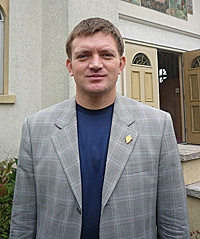 Sergei Fomin, keeper of the myrrh-gushing icon "The Softening of Evil Hearts.”
Sergei Fomin, keeper of the myrrh-gushing icon "The Softening of Evil Hearts.”
SF: First of all, we now have our own church. And people come there specifically to the icon of the Mother of God for services, and they do not want to let it go out of the church for long. But the icon is already known, loved and awaited, and it comes not only to large cathedrals, but also to distant villages, to village priests and their few parishioners, where no holy thing has ever been brought.
Our next trips are to France and Belgium. We will also try to take the icon for the festivities of the consecration of the church in Cyprus.
***
…While Sergei and I were conversing, the crowd kept growing, and the Akathist was served in the overfilled church.
Russians abroad are, in comparison to believing people in Russia, more reserved, more collected, and, in my opinion, less emotional. In silence, people came to the holy icon, prayed lengthily and reverently touched the little icons, acquired for a donation, to the prototype. Afterwards they did not leave for a long time, inhaling the unearthly aroma that the holy icon gives forth.
Tatyana Veselkina spoke with Sergei Fomin. (26/10/2009)
